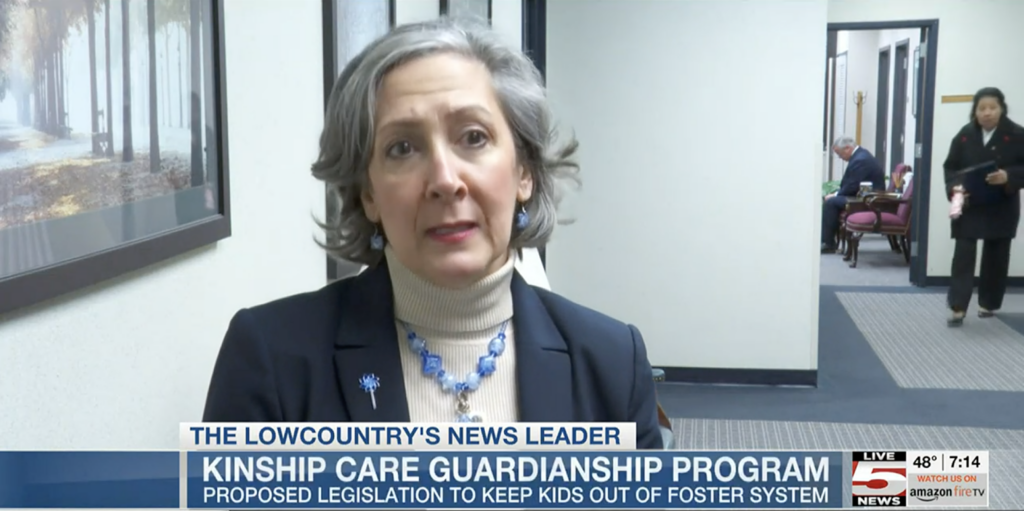
Sue Williams, Children’s Trust CEO
By Mary Green
COLUMBIA, S.C. (WCSC) – About one in four children currently in the state of South Carolina’s foster system are living with a relative who is not their parent.
This is kinship care, and in South Carolina, it was expanded last year to also include fictive kin, people not related by birth, marriage, or adoption to a child but who share a significant emotional relationship with them, like a family friend, neighbor, or coach.
When a child’s biological parents are unable to take care of them, child advocates say living with a relative or someone with whom they already have a close relationship can be a positive alternative.
But these families don’t necessarily get the same help as foster families.
“Considering child outcomes are typically better when placed with kin, why wouldn’t we support doing the same for kinship care as we do for foster care?” Daryl McCulley of Kershaw County asked a state Senate panel Thursday in Columbia.
McCulley spoke to the lawmakers on behalf of S.380, a bill with bipartisan support to establish a kinship guardianship assistance program in South Carolina.
He has cared for his now-13-year-old grandchild since infancy.
“Our child came to us ‘temporarily’ originally, and we anticipated it being that way, temporary, and with a couple of few months, we realized it’s not temporary,” McCulley said.
The proposed program is designed to support permanent placements of kids and teens with their kinship caregivers, getting them out of the foster system forever.
“It’s really important when these kids have trauma for them to be able to begin that healing process, and that’s best done with family and friends that they know,” Sue Williams, CEO of the statewide organization Children’s Trust of South Carolina, said. Her organization also supports the bill’s passage.
The bill would provide kinship caregivers with more legal authority to care for children, which they say would make processes like obtaining birth certificates easier.
“These kids come to people in the middle of the night — literally come to a grandparent or a family member in the middle of the night, with whatever’s on their back, and they have no help to make these things happen,” McCulley said.
The legislation would also establish Kin GAP (Guardianship Assistance Program), allowing kinship caregivers to receive financial assistance similar to what foster families get from the government.
A fiscal impact estimate from the Revenue and Fiscal Affairs Office reports the federal government can give South Carolina about a half-million dollars in the next year for this, and the state would also have to put in about $1.2 million of its own money.
South Carolina is one of just 10 states that has not tapped into this federal funding, though it has been around for more than a decade.
“I’m trying to catch us up,” Department of Social Services Director Michael Leach recently told a House budget-writing subcommittee. “There are things that we have not done in this state that somebody should’ve done — no blame — but I don’t want to be the last.”
DSS also said it costs the state less money to subsidize permanent guardianship than to pay for foster care, allowing the dollars saved to be put toward helping more families.
McCulley said this legislation would especially help grandparents and older relatives living on fixed incomes.
“They don’t want to let the child go into foster care because it’s a family member and so on, and they want to take care of the child. If they do that, today, they may not have any financial support, and they’re already struggling,” McCulley said.
A three-member Senate subcommittee advanced the bill Thursday to the full Senate Family and Veterans’ Services Committee, which will next meet Wednesday.
Source: WCSC



